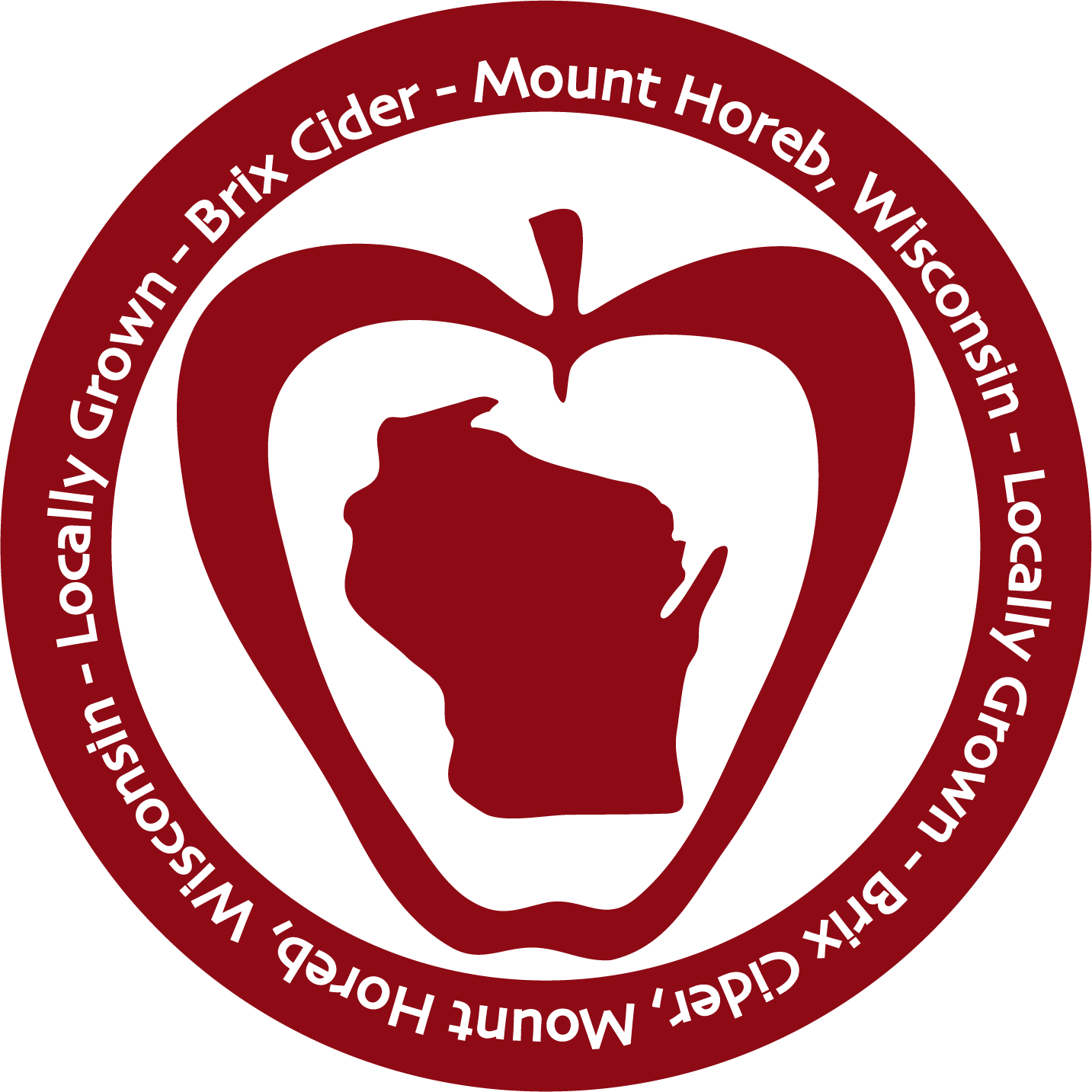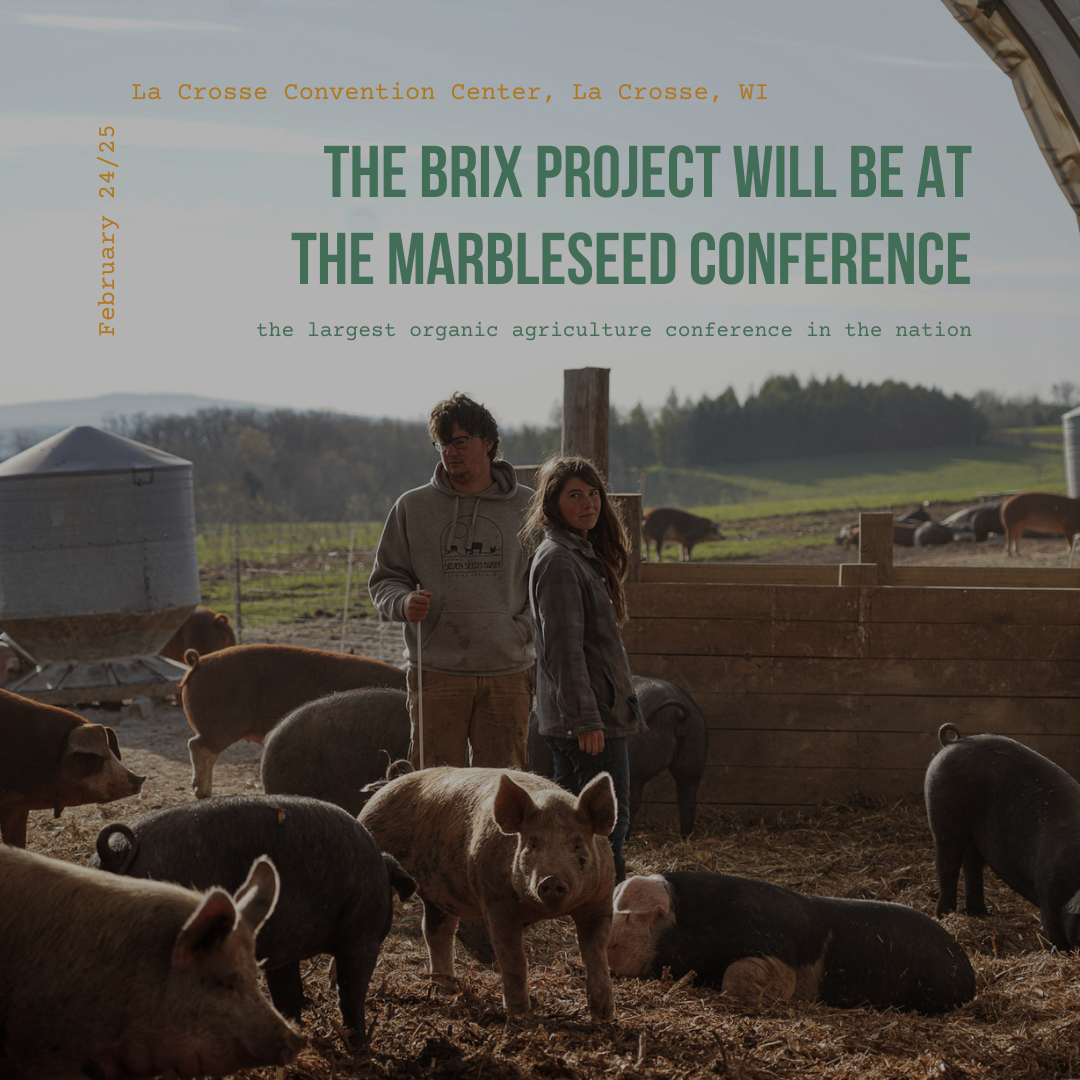Taking the Brix Project on the Road
The Brix Project is a 3 year USDA-funded program to support the growth of the regional food system that Brix Cider is fostering through media and outreach that draws people closer to the food they eat, the land it came from, and the people who grew it.
When we set out on the Brix Project, the mission was to expand upon what is working in our regional food system and demonstrate how a business like Brix Cider can serve as a consistent hub for local food flowthrough.
In the first two years of the Brix Project we shared our academic findings and farmer-focused storytelling with our immediate community through film screenings, panel discussions, science education nights, and a guest chef dinner series.
This spring we took the Brix Project to new audiences: agriculture and academia via the Marbleseed Organic Farming Conference in La Crosse, the Wisconsin Fruit and Vegetable Conference in Wisconsin Dells, and the American Association of Geographers Annual Meeting in Denver. We presented various aspects of the Brix Project to groups who would look at our work with a critical perspective of scalability and applicability to other regional economies.
MARBLESEED ORGANIC FARMING CONFERENCE
As the largest organic and regenerative farming conference in the United States, Marbleseed (formerly known as Midwest Organic Sustainable Education Service MOSES) brings together over 3000 attendees and presenters from the agriculture, non-profit, consumer packaged goods, and academic world. This tradeshow, networking, and educational conference has been held annually since 1989.
The Brix Project team had the opportunity to screen six of our films and host a panel discussion featuring Michael Dolan of Seven Seeds Farm, Matt from Brix, Jules Reynolds, Brix Project Community Outreach and Evaluation, and Jonnah Perkins, Brix Project Creative Director.
“As a farmer and having worked on global food and fashion marketing campaigns, I know firsthand that the beauty of small-scale agriculture is used by marketers to sell just about anything. Farmers are highly attuned to this. It was so validating to have vegetable farmers, orchardists, and diversified growers toss questions to us that built an incredible dialog around grassroots storytelling and integrity of academic research in rural communities,” Jonnah Perkins, Brix Project Creative Director.
It was exhilarating showing our films to a room of people who were all seeing the project through the eyes of agricultural viability and authenticity. We shared our own personal stories of why the circular economy that Brix fosters is meaningful to the team and how we are uniquely tied into the regional supply chain and how our specializations come through in the Brix Project.
THE WISCONSIN FRESH FRUIT AND VEGETABLE CONFERENCE
This practitioner’s conference brings together fruit and vegetable growers and members of industries that use fresh produce grown in Wisconsin. Matt from Brix and Dan Kelter from Ski Hi Fruit Farm teamed up to present on how Brix Cider partners with Ski Hi Fruit Farm to produce and sell custom hard ciders. Both apple growers and winemakers were present at the conference, and the presentation was intended to help catalyze similar partnerships around the state so that growers of local produce and small businesses that use that produce can both prosper.
ASSOCIATION OF AMERICAN GEOGRAPHERS
The Association of American Geographers (AAG) Annual Meeting brings together thousands of geographers, environmental scientists, and sustainability specialists from around the world. This meeting provides an opportunity to share evaluation, research, and applied projects with an expert community for feedback, dissemination of results, and networking.
Jonnah and Jules represented The Brix Project at the AAG Meeting in Denver to share out the processes and outcomes of the past three years of local food system development. This presentation, titled “Storytelling as Method, Resilience as Practice: Cultivating transformation in community food systems through community-engaged work” focused on the unique partnership between two locally-owned businesses (Brix Cider and Black Krim Creative) and University of Wisconsin - Madison. Jonnah and Jules shared the methods and evaluation results that have emerged from this partnership for successful organizing and engagement within the food system, such as combining storytelling, data, and building community through local events.
“I think the fact that academic audiences want to hear about what we're doing with the Brix project suggests that we're doing something innovative and unique. I'm hopeful that people around the country can take some of our lessons learned and apply them to their own locales and their own projects.” Matt Raboin, Brix Cider Co-Owner and Brix Project Program Director.
“As a researcher, I’m excited about sharing our work through The Brix Project with other academic audiences to model how collaborative and community-oriented research should be done. This partnership is unique in that it truly is led by and for the community, including the questions and outcomes, and I hope other academics can learn from this approach,” Jules Reynolds, UW Wisconsin-Madison PhD Candidate.
Bringing the Brix Project to larger audiences has given the team a new perspective on the strength and impact that our work can have on foodsheds beyond the Upper Midwest. From the outset of the Brix Project we wanted to share the insights and successes we have had in the circular economics that surround Brix. Engaging with academic leaders and the agriculture industry has reflected back to us that our work can serve as a model for food system change across many regions.




